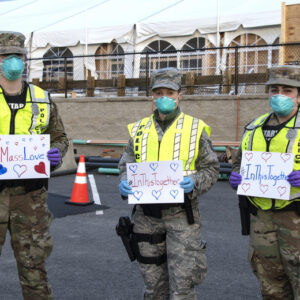These are unprecedented times that generate a lot of questions in our minds as we go about trying to understand and cope with a new and perilous situation.
What makes a true American? Is there such a thing? I was born in Bridgeport, Connecticut and my husband Angelo was born in Muro Lucano, Italy and we are both citizens. We pay our taxes, support our schools and vote in every election. But are we true Americans? I ask because in this time of the novel coronavirus pandemic, I have a lot of mistrust towards our president. Is he a true American? I think he has put our country in danger and I am unnerved at how he encourages others to follow his lead in carelessly ignoring the research and advice from medical professionals. And by others, I am referring to the partisan politicians who echo the president’s attitude and demeanor by politicizing the pandemic. Do I have to unconditionally support the president to be a true American?

And what about those armed and angry mobs storming the offices of elected officials–such as recently happened in Michigan where Gretchen Whitmer is Governor— to protest the measures put in place for the public’s safety? Are they true Americans? I bet they think they are. They think they are defending their liberties–the freedom to come and go as they please (and also buy guns while they’re at it). I feel the current measures are in place for the greater good of the public, not just me; I don’t feel like my liberties are being limited. It’s a pandemic for Pete’s sake, not a reelection platform.
And what about my freedoms? I’d like to feel safe going out of my house, without worrying that someone who thinks they’ve been cheated out of their freedom might just put me in danger, by transmitting the virus to me or maybe just letting loose with an errant bullet from their gun. Is it un-American to expect our elected officials to look out for me and trust their judgment and not the arbitrary grousing of a few guys who want to hang out at their favorite bar?
Something I read recently made me think a little deeper about what it means to be a true American in the midst of being quarantined by a pandemic. It was a post on social media about all of us–the whole world really–being in the same boat. A rallying cry to unite that explained: In reality we’re not all in the same boat at all, we’re in the same storm. The storm–or virus–knows no boundaries of privilege or color, but it does impact one differently depending on each of those criteria. In addition, the partisan qualities of the pandemic have led some people to focus on how the safety guidelines and closures impact them, not so much others. This is blatantly demonstrated in the crowds of people gathering to protest their so-called civil liberties as they’re shouting in the faces of the police who are there to protect them, blocking entrances to hospitals. It is all so . . . selfish.
It’s time for Americans to think about what it means to be democrat or republican. The lines have been drawn so starkly that being a Democrat or a Republican mean very different things these days. Declaring oneself as one or the other represents as much personal values as it does a political platform. What kind of country have we become that a representative from one party alone suggests letting the virus run its course, as those it will likely kill are the weak, elderly and homeless?

Or prisoners. In California, non-violent prisoners with less than 60 days left on their sentences were released to reduce the spread of the coronavirus throughout the inmate population and the staff at many state prisons. I responded–positively I might add–to a post on social media trashing the governor of California about the issue, citing an article from the LA Times. Someone replied back to me, “maybe they can come have a meal at your house (once they’re released).” And it surprised me, because don’t Republicans typically espouse basic Christian tenets in their rhetoric such as caring for the poor? Doesn’t pro-life mean every life? Or just some.
The pandemic of coronavirus has turned everything upside down; it didn’t break the country, it only revealed the true nature of her citizens. And it emphasized the great divide between Americans. We are free to stay at home, wear masks, observe the rules at the grocery store. Citizens are also free to protest, carry guns, gather on beaches, get a tattoo. It might be freedom, but it certainly doesn’t show respect for each other or an understanding of the potential danger that we all face.
Am I a true American? I am judgmental–even angry sometimes–about people ignoring the restrictions for containing the virus and flattening the curve. I am critical of those who can’t see physical distancing, closing businesses, keeping children at home, heeding the advice of medical experts, supporting our first responders as reasonable actions that we can take as Americans to fight the spread of the virus. I don’t think I am stepping all over their liberties, but the “ladies” I see all over the news shouting in righteous indignation demonstrate otherwise. What some Americans feel are their liberties aren’t what others think. For me, the definition has to include the fact that liberties aren’t one-size-fits-all. We are a country of differences; different cultures, needs, privileges and opportunities.
Even Abraham Lincoln had trouble with the definition, over 150 years ago, when he wrote:
“The world has never had a good definition of the word liberty, and the American people, just now, are much in want of one. We all declare for liberty; but in using the same word we do not all mean the same thing.”*
A true American would know that.
*April 18, 1864 Address at Baltimore












